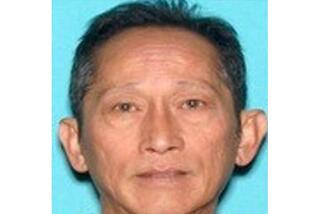Hong Kong opposition party member arrested for allegedly falsifying story of abduction
- Share via
Reporting from Hong Kong — Hong Kong police arrested a pro-democracy opposition party member on Tuesday after they said surveillance footage contradicted his claim that he had been kidnapped and tortured by mainland Chinese agents.
Last week, Howard Lam Tsz-kin, a member of Hong Kong’s Democratic Party, sent shock waves through the city when he claimed that suspected mainland agents snatched him from a busy shopping street, forced him into a van, beat him and tortured him by driving 21 staples into his thighs.
They blamed him for attempting to send a postcard signed by soccer star Lionel Messi to Liu Xia, wife of the late Nobel laureate and high-profile Chinese dissident Liu Xiaobo, Lam said.
Yet just after midnight Tuesday, police arrested Lam at his home on suspicion of fabricating the story, adding a bizarre twist to an episode that has underscored deepening tensions between the former British colony and mainland China.
In a statement, police accused Lam of “misleading an officer” after they found no evidence of the abduction while canvassing the area. They condemned Lam’s accusations, calling them a “waste of police resources” that caused “unnecessary public panic.” If Lam is convicted of filing a false report, he faces a $130 fine and up to six months’ imprisonment.
Police did not comment on Lam’s possible motive.
On Monday, Hong Kong’s independent Factwire News Agency revealed screenshots of surveillance video showing a man with Lam’s build, height, gait and clothes walking on the street unharmed at the time of his alleged abduction. The man in the video wore a cap, sunglasses and surgical mask.
Lam told Factwire the man was not him and suggested it could be a body double.
Lam’s claim is the latest in a series of allegations that Chinese agents have been operating illegally in the city in recent years, abducting people and spiriting them to the mainland to “aid investigations.”
Beijing governs Hong Kong under a “one country, two systems” framework, allowing the territory to maintain a semi-democratic government, freedom of speech, the right to gather and protest, among other freedoms — rights that are not enjoyed on the mainland.
Yet Hong Kong residents now fear that the mainland is chipping away at the territory’s core freedoms, despite promises Beijing made 20 years ago when it regained sovereignty over the former British colony.
Last month, a Hong Kong court disqualified four pro-democratic, popularly elected lawmakers from the city’s Legislative Council after ruling that their oaths — which were peppered with gestures of defiance — were invalid.
In late 2015, five Hong Kong booksellers linked to the publisher Mighty Current, which sold books dealing in gossip about the Communist Party, went missing. Months afterward, the booksellers turned up in the custody of Chinese authorities. They were soon paraded on state television confessing to selling books illegally on the mainland.
In late January, Chinese billionaire Xiao Jianhua went missing from Hong Kong’s Four Seasons hotel. Surveillance images showed Xiao, the founder of the Chinese conglomerate Tomorrow Group, in a wheelchair leaving the hotel, surrounded by five or six unidentified men. His circumstances remain unclear.
“The situation reflects the growing paranoia in Hong Kong about China,” said Stephan Ortmann, assistant professor of political economy at the City University of Hong Kong. “There’s heightened anxiety, heightened worry.”
Lam remains in police custody and will be applying for bail, according to Albert Ho, former chairman of the Democratic Party who has known Lam for two decades.
“I still tend to believe him,” said Ho. “I hardly understand how a person would try to fabricate such a complicated story. If so he should be more clever, have made the story more simple.”
Choi is a special correspondent.
More to Read
Sign up for Essential California
The most important California stories and recommendations in your inbox every morning.
You may occasionally receive promotional content from the Los Angeles Times.













